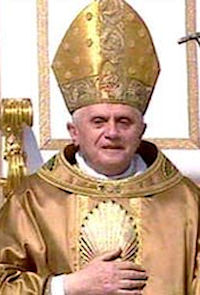Cardinal Ratzinger's Views
 Ratzinger was Dean of the College of Cardinals and had long been considered one of the two or three most powerful men in the Vatican. As head of the Holy See's Congregation for the Doctrine of the Faith, the Vatican's watchdog for theological orthodoxy, Ratzinger developed a reputation for unapologetic conservatism and a firm hand with wayward theologians.
Ratzinger was Dean of the College of Cardinals and had long been considered one of the two or three most powerful men in the Vatican. As head of the Holy See's Congregation for the Doctrine of the Faith, the Vatican's watchdog for theological orthodoxy, Ratzinger developed a reputation for unapologetic conservatism and a firm hand with wayward theologians.
In June 2004 Cardinal Ratzinger wrote that "Regarding the grave sin of abortion or euthanasia, when a person's formal cooperation becomes manifest (understood, in the case of a Catholic politician, as his consistently campaigning and voting for permissive abortion and euthanasia laws), his Pastor should meet with him, instructing him about the Church's teaching, informing him that he is not to present himself for Holy Communion until he brings to an end the objective situation of sin, and warning him that he will otherwise be denied the Eucharist. ... When 'these precautionary measures have not had their effect or in which they were not possible,' and the person in question, with obstinate persistence, still presents himself to receive the Holy Eucharist, 'the minister of Holy Communion must refuse to distribute it' (cf. Pontifical Council for Legislative Texts Declaration 'Holy Communion and Divorced, Civilly Remarried Catholics' [2002], nos. 3-4). This decision, properly speaking, is not a sanction or a penalty. Nor is the minister of Holy Communion passing judgement (SO PLEASE DON'T START WHINING "JUDGE NOT") on the person's subjective guilt, but rather is reacting to the person's public unworthiness to receive Holy Communion due to an objective situation of sin."
Joseph Cardinal Ratzinger was widely assumed to have played a major role in drafting the 1998 Encyclical "We Remember," which expressed contrition for the failure of Catholics to offer more protection to Jews and for the fact that some took part in their persecution. His Christmas reflections on December 29, 2000, memorably expressed remorse for the anti-Jewish attitudes that persisted through history, leading to "deplorable acts of violence" and the Holocaust. Cardinal Ratzinger said: "Even if the most recent, loathsome experience of the Shoah (Holocaust) was perpetrated in the name of an anti-Christian ideology, which tried to strike the Christian faith at its Abrahamic roots in the people of Israel, it cannot be denied that a certain insufficient resistance to this atrocity on the part of Christians can be explained by an inherited anti-Judaism present in the hearts of not a few Christians."
Cardinal Ratzinger, in introducing the 2001 document of the Pontifical Biblical Commission, The Jewish People and Their Sacred Scriptures in the Christian Bible asks the question: "Did not the presentation of the Jews and of the Jewish people, in the New Testament itself, contribute to creating a hostility to this people which the ideology of those who wanted to suppress it has encouraged?" This document and that of the Holy See's Commission for Religious Relations with the Jews (We Remember, 1998) candidly admit the historical link between the ancient and modern forms of anti-Semitism. The Biblical Commission states that many passages in the New Testament that are critical of the Jews "served as a pretext for anti-Jewish sentiment and, effectively, have been used for this purpose" (n. 87), while the latter acknowledges that "sentiments of anti-Judaism in some Christian quarters, and the gap which existed between the Church and the Jewish people, led to a generalized discrimination" towards the Jews over the centuries, in particular in Christian Europe.
|
NEWSLETTER
|
| Join the GlobalSecurity.org mailing list |
|
|
|

